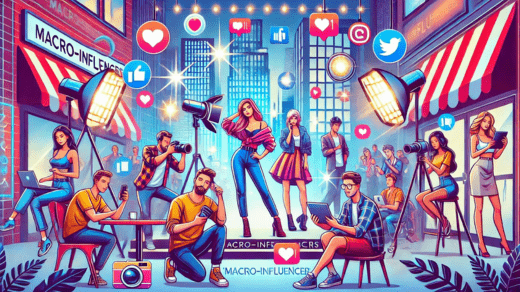In the ever-evolving world of digital marketing, one trend that continues to grow is the use of micro-influencers to drive brand engagement, especially in niche markets. While big-name celebrities and macro-influencers were once the go-to choices for brands, today’s marketing strategies are shifting towards micro-influencers, particularly in specialized industries. These influencers, often with a modest following of 1,000 to 100,000 followers, are emerging as powerful advocates in niche marketing.
This article explores the key role of micro-influencers in niche marketing, highlighting their unique advantages and why brands are increasingly turning to them for specialized campaigns.
What Are Micro-Influencers?
Micro-influencers are people that have credibility in different niches. While this is the case with the macro influencers whose content is targeted at the general populace, the micro influencers’ niche is more specific. This is because they have fewer followers than the other influences but their followers are loyal and tend to believe in the influencer’s opinion due to the perceived genuineness of the influencer and his/her approach.
He or she might be an expert in some certain field and his or her followers also are interested in this particular sphere, for instance, vegan recipes, sport, or ecological fashion. This enables the micro-influencers to create a strong bond and reliability with the audience hence perfect for brands that target a special niche.
The Power of Niche Marketing
Niche marketing is the targeting of a small, specific section of a larger market area. It is made specially to appeal to a specific target audience in terms of hobbies or requirements that marketers tend to overlook. Some of the examples of niche markets are the organic Skin care, Home care products, and Pet care services. Brands in these areas, target to create a one-to-one connection with the consumer and work towards gripping the consumer’s attention in a way that the consumer will not be able to turn a blind eye towards the ads.
Nuances of marketing is one area where micro-influencers are particularly effective, and that is because they sell through genuine interactions. They are usually more specific in their themes and topics, which would be beneficial to the concepts of the select-notice brands to target those customers that are more knowledgeable about the product.
Authenticity and Trust
One of the most significant advantages of working with micro-influencers in niche marketing is their authenticity. Unlike macro-influencers or celebrities, who might endorse a wide range of products without a personal connection to the brand, micro-influencers are usually more selective. They tend to collaborate with brands that align with their values and the interests of their followers.
As a result, their recommendations come across as more genuine and relatable. Studies show that consumers are more likely to trust the opinion of someone who is seen as a peer or expert in a particular field. This authenticity translates into higher engagement rates, as followers feel they are getting sincere advice rather than a paid promotion.
Higher Engagement Rates
While micro-influencers may have fewer followers than their celebrity counterparts, they often enjoy higher engagement rates. According to research, engagement levels—measured by likes, comments, and shares—tend to decrease as follower counts increase. Micro-influencers, with their smaller but more dedicated audience, can achieve engagement rates significantly higher than macro-influencers. To amplify their presence, many micro-influencers today are using SMM panels like IGSmmPanel and TopSMMClub to boost their social media engagement, growing their follower base and enhancing visibility. These tools help influencers reach new audiences more efficiently while maintaining the organic connection with their followers.
For brands in niche markets, this level of interaction is invaluable. It ensures that their message is reaching an audience that not only sees the content but actively engages with it. For example, a vegan beauty brand collaborating with a micro-influencer who specializes in cruelty-free makeup is likely to see a higher level of interest from that influencer’s audience than if they used a general beauty influencer with a much larger but less focused following. By leveraging SMM panels, micro-influencers can scale their outreach while maintaining authenticity, which further benefits the brands they partner with.
Cost-Effectiveness
Working with micro-influencers can also be more cost-effective for brands, particularly those with smaller marketing budgets. Macro-influencers and celebrities often charge substantial fees for sponsored posts, and while they reach a larger audience, the conversion rates can be lower, especially for niche products. In contrast, micro-influencers charge less for their services but can deliver more targeted and impactful results.
Moreover, many micro-influencers are open to creative collaborations beyond just paid sponsorships. They may accept free products, affiliate commissions, or even unpaid partnerships if they genuinely believe in the brand’s values and products. This flexibility allows smaller brands to engage in influencer marketing without breaking the bank.
Building Long-Term Relationships
Another key benefit of working with micro-influencers is the opportunity to build long-term partnerships. Since these influencers often work within niche markets, they are more likely to establish lasting relationships with brands that align with their content and audience. This long-term collaboration benefits both parties, as the influencer can continue promoting the brand in an organic and consistent way, while the brand enjoys continuous exposure to a highly relevant audience.
Additionally, micro-influencers are often more approachable and easier to communicate with than larger influencers, which can foster a more collaborative and mutually beneficial relationship. This close relationship allows brands to refine their messaging and adapt their campaigns based on feedback from both the influencer and their audience.
Conclusion
Micro-influencers are vital in niche marketing, providing brands with access to engaged, specialized audiences. Their authenticity, high engagement rates, cost-effectiveness, and potential for long-term collaborations make them invaluable assets for brands aiming to connect with targeted market segments.
As consumers increasingly value personal connections and authenticity, the role of micro-influencers in niche marketing will continue to grow. Brands that leverage this influence effectively can enhance their reach and impact in today’s competitive digital environment.




